Climate Change
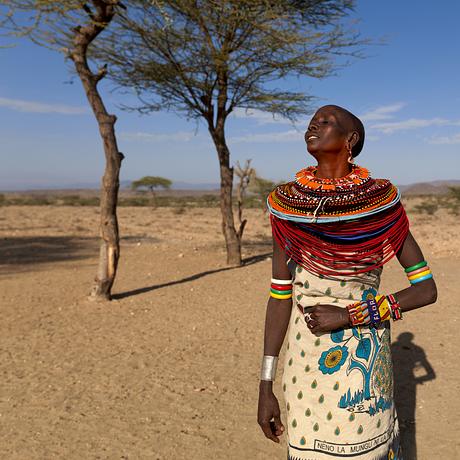 © Lafforgue/Survival International
© Lafforgue/Survival InternationalIndigenous peoples are on the frontline of climate change.
They live where the impacts of climate change are the greatest and they depend largely on the natural environment for their livelihoods and way of life.
Many of the drivers of climate change—including oil, gas, mining and deforestation— have already destroyed Indigenous lands.
Many of the so-called solutions proposed to mitigate climate change also threaten the lands and lives of Indigenous peoples. Often, carbon offsetting projects, now re-branded as “Nature-based solutions”, violate their rights and make it easier for governments, companies, big conservation organizations and others to steal, exploit and destroy their land while doing nothing to reduce carbon emissions. Nature-based solutions schemes are carbon colonialism and won’t stop the climate crisis.
Indigenous peoples are the best conservationists – their territories are a bulwark against deforestation and are home to significant biodiversity. For example, according to the UN FAO, Brazil's Indigenous territories have more species of mammals, birds, reptiles, and amphibians than in all the country's Protected Areas outside these territories”.
"The rich countries have burned and destroyed many kilometers of Amazon forest. If you cut down big trees and set fire to the forest, the Earth dries up. The world needs to listen to the cry of the Earth, which is asking for help."
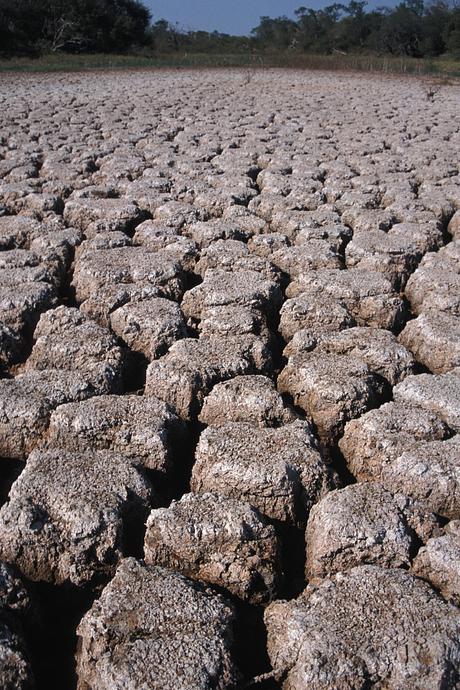
What are we fighting against?
Nature based-solutions:
This term has come to mean the use of mechanisms such as planting trees, restoring habitats and preserving forests to absorb atmospheric CO2, and adapt to the effects of climate change. It might sound good but in concrete terms, it means:
“Fortress Conservation”Indigenous peoples are being illegally evicted from their ancestral lands in the name of conservation, to create national parks and other Protected Areas that are now claimed to mitigate climate change. It is argued that Protected Areas can “protect” against deforestation and other carbon-releasing activities, and thus could be used to “compensate” for carbon emissions elsewhere. In practice, this means that Protected Areas can be used to generate carbon credits that polluting companies, governments or individuals can buy in the markets to “offset” their emissions. Meanwhile, in these same areas, Indigenous peoples are blamed for an environmental destruction that they didn’t cause. They are accused of “poaching” when they hunt for food and of “overgrazing” when they graze their animals sustainably. And they face arrest, beatings, torture and death in their own territories at the hands of park rangers, while fee-paying big game hunters and tourists are encouraged.
Big conservation NGOs, like WWF, have pushed to turn 30% of the planet into Protected Areas by 2030, claiming this will help mitigate climate change and protect biodiversity. The same NGOs partner with logging companies and corporations responsible for enormous carbon emissions and environmental damage. This 30% proposal was agreed at the COP15 summit between governments in Montreal - and will represent the biggest land grab in history.
If implemented, it will have terrible consequences for our environment and for Indigenous peoples. It will steal lands from those best placed to protect them while diverting attention from the real causes of environmental and climate destruction. Many Protected Areas invite mass tourism, and are often home to trophy hunting, logging, and mining operations.
For more information join our campaign to #DecolonizeConservation
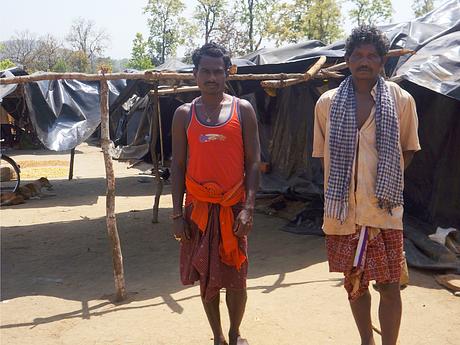
Other carbon offset projects
The idea of projects based on “offsetting” is that corporations and governments responsible for a certain amount of carbon dioxide emissions can fund projects elsewhere that supposedly “capture” an equivalent amount of carbon or prevent its release. They can do this through buying offsets in carbon markets. The use of these terms gives people the idea that it’s possible to “compensate” for emissions, although there are many scientific and practical problems with this. Moreover, carbon offsetting allows the real polluters to greenwash their image, while doing nothing to reduce their emissions and indeed continuing to pollute.
Currently, there are two primary ways of offsetting carbon. Both are ineffective and dangerous for Indigenous peoples. They also divert money away from actual efforts to reduce fossil fuel emissions.Projects like REDD+ (Reducing Emissions from Deforestation and Forest Degradation in developing countries), which supposedly protect forests from being deforested, generate carbon credits that corporations and governments can buy to offset their carbon emissions. Indigenous people have repeatedly voiced concerns about REDD+ projects. It puts a price on their lands and forests which is likely to result in even more land grabs. A large proportion of the forests in REDD+ schemes are territories of Indigenous or other local people. These projects undermine their ways of life, as they lose control over their land.
Another way to “capture” significant amounts of carbon is by planting trees. But many offset projects sow monoculture plantations of just a few fast-growing tree crops, like eucalyptus and acacia, to make money. In fact, most such plantations are harvested in a few years to make products like paper and charcoal, which quickly returns all the captured carbon back to the atmosphere. Moreover, many of the new plantations are more prone to fires and, in any case, they would need to grow for decades before they start absorbing much carbon. Perhaps most importantly, replacing other ecosystems, like grasslands, with tree planting schemes destroys the existing biodiversity and devastates the livelihoods of Indigenous and local people who rely on the area’s natural resources.
"We have seen the experiences of other Indigenous people, who accepted REDD and its carbon credits and conservation projects. They can no longer hunt, grow crops or use materials they need for celebrations and rituals. We know how to take care of nature because she is our mother and we don't want another carbon credit agreement, because it is just another way of removing us from our sacred lands."
Survival is currently campaigning to end carbon offset projects in Protected Areas where the rights of Indigenous peoples are violated. For more information visit our Blood Carbon page.
Electric car batteries
Around the world governments and car companies are promoting electric vehicles as an “ethical” alternative to conventional cars and as a key technology to reduce oil use and fight climate change. But the rush for a ‘green transition’ can lead to even more land grabs of Indigenous territories.
The drive for nickel risks wiping out an uncontacted tribe in Indonesia. Uncontated Hongana Manyawa are already on the run from nickel mining which is tearing up their ancestral lands and damaging their rivers.
The project is part of Indonesia’s plan to become a major producer of electric car batteries, by mining and smelting nickel and other minerals. The uncontacted Hongana Manyawa, despite contributing nothing to climate change, now risk being wiped out by the industrialized world’s switch to electric cars.
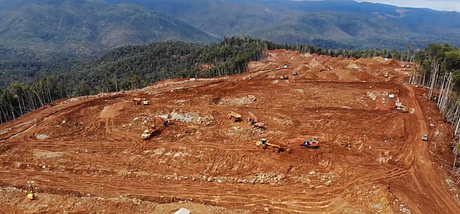 © Eramet
© Eramet
What are we fighting for?
Solutions to climate change and environmental problems must respect human diversity and Indigenous peoples’ rights. Therefore, these solutions must be anti-racist, anti-colonial and rooted in justice. And they must address the real causes of environmental destruction: exploitation of natural resources for profit and growing overconsumption, driven by the Global North.
This approach means that governments must respect, protect and uphold Indigenous peoples’ rights, including recognition of their land rights. This is by far the most effective and just way to protect biodiversity.
We know these solutions are not easy to implement, but they are real and they work.
Indigenous peoples are the best conservationists - their territories safeguard 80% of global biodiversity and are a bulwark against deforestation.
Indigenous peoples and their rights must be at the core of climate and environmental action. It is time to decolonize conservation, recognize Indigenous lands rights, stop hiding behind false solutions and start addressing the real cause of the environmental crisis.
"The gift of biodiversity is ours at the moment, but if we lose it, it won't be just that we lose the animals and the plants; us humans will suffer as well. I can tell you that there are rivers here whose beds are drying up, and this has never happened before. Nowadays we can't eat wild mangoes as we used to in the dry season, because they don't grow like they used to. These are just some of the changes happening due to the destruction of the forest."
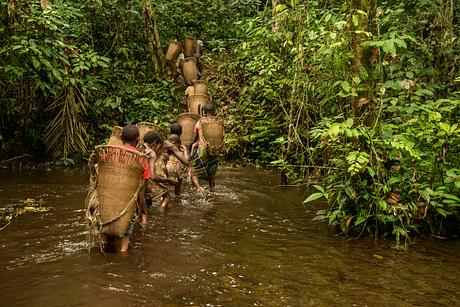 © Nicolas Marino
© Nicolas MarinoA guide to decolonize language in conservation
Decolonize Conservation: Global Voices for Indigenous Self-Determination, Land, and a World in Common
Anatomy of a Multi-Million Dollar Colonial Carbon Project in Kenya
Blood Carbon: how a carbon offset scheme makes millions from Indigenous land in Northern Kenya
Sign up to the mailing list
Our amazing network of supporters and activists have played a pivotal role in everything we’ve achieved over the past 50 years. Sign up now for updates and actions.
